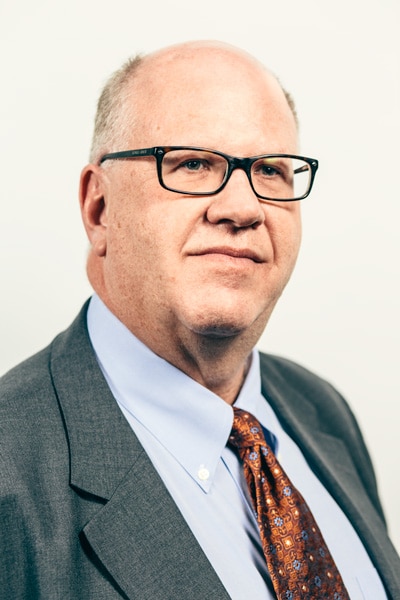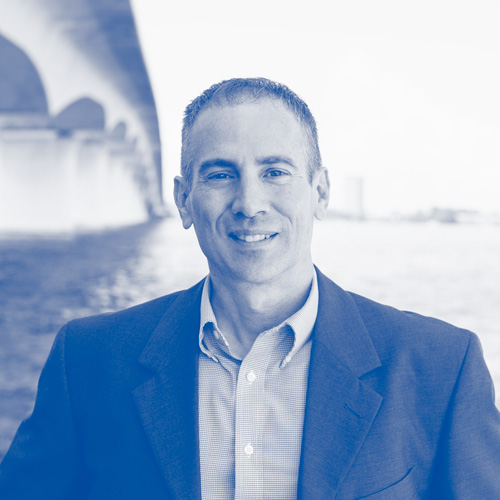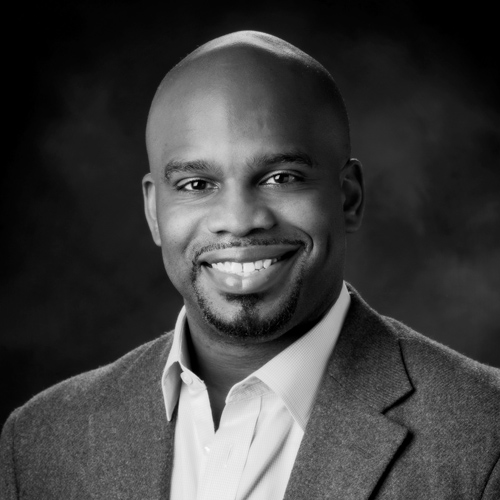When asked about what exactly his job entails, Gary Friedlander simply chuckles.
“My kids like to say, ‘He talks on the phone and types on the computer all day,’” Friedlander says.
Although he’s half-joking, there’s a reason his children have a hard time wrapping their heads around just what their dad does for a living. As senior vice president and division general counsel at global information solution provider TransUnion, a major portion of his job is overseeing the global intellectual property (IP) program. In his words, it involves a lot of “filing for patents and trademarks.”
That’s complicated enough on its own, but it’s actually the non-IP component of his job description—the word “global”—that presents the most unique and exciting challenges for Friedlander. He manages legal operations for all of the company’s legal groups outside of the United States, meaning that he has to make sure all respective countries are working together. He’s a legal diplomat, if you will, as he encourages the varying teams to understand how operations differ from country to country. Unsurprisingly, the first nation he brings up is the one both of us happen to live in.
“One of the biggest challenges is educating folks in the US that the rest of the world isn’t the US,” he laughs. He’s talking specifically about the United States being “an outlier” when it comes to the regulation of privacy. “[In] the US, it’s an opt-out system,” he continues. “So your personal information may be used for a number of permitted uses unless you opt out. Generally, it works really well in the United States, and we have a huge economy as a result of it. In most other parts of the world, it’s an opt-in system requiring obtaining prior consumer consent.”
So how does one go about ensuring that so many different legal teams from so many different countries work in harmony, especially when it comes to complex issues such as contract negotiation and regulatory matters? Friedlander’s most useful tool, he explains, is an initiative called “Start, Stop, Change, and Transfer.” It’s a term that actually came from outside of TransUnion’s legal team—coined instead by a regional manager, who first implemented the initiative in Canada. Friedlander was so impressed by “Start, Stop, Change, and Transfer” that he decided to adopt it as well. He breaks it down by describing a string of simple, yet effective examples.
For Stop: “We’re looking at things that we can stop doing,” Friedlander says. “Do we have to be looking at coffee-vendor agreements? I mean, really, it’s funny, but some of our time is occupied by looking at coffee vendors.”
Likewise, he recently realized that TransUnion was devoting unnecessary energy to pushing back against liability policies at hotels, where many of the company’s meetings are held. Most hotel agreements state that the liability is on the guest should there be an accident or some other unfortunate event. This may sound like a problem at first, but when Friedlander thought about it, the issue at hand wasn’t that much of a concern.
“In our experience, how often does something really happen at a hotel? And if it did, would the agreement be enforced the way it’s written?” Friedlander asks. He felt as though much of his attorneys’ time was being shortened by having to review these types of business arrangements that, overall, are low-value to the company. “They’re not cheap resources,” he says about the lawyers, adding that their talents would be better suited toward working on high-value business deals and strategy.

That leads in to the “Start” component. Once the superfluous work tasks are out of the way, Friedlander and his colleagues can devote a bigger chunk of their time to developing new practices that improve global collaboration. One of the new initiatives came from right here in the United States.
“A while ago,” Friedlander recalls, “the US folks started setting up times for the marketing folks to come in. We [would] spend an hour or a half hour with them, then knock out a bunch of issues really quick so they don’t linger in e-mails. That makes sales and marketing very happy, and it makes us really happy because it frees us up to spend a lot more time looking at other issues. So we’re starting to roll that out in various markets now.”
That’s where “Change” comes in. One of the most significant business practices Friedlander has helped alter at TransUnion is the way in which his teams communicate. Even though everyone is operating out of different countries, he believes it’s important to speak face-to-face or at least on the phone whenever possible, as opposed to e-mail.
“That’s really started this year,” he says. “Conference calls are okay, but the video calls—especially [with] what you can do now with Skype—really help. It helps when they can see each other’s faces.”
Friedlander also tries to take the face-to-face interaction one step further by actually going to visit the countries he’s working with. “I try to get to all of our regions at least once a year,” he says. “There are some countries I do visit more than once, such as India, which I travel to three or four times a year. One reason is because I’m on the board of directors of one of our India companies, but it’s also a very important growth market for us. You’ve got 1.2 billion people, and there’s still a lot of work to be done to help India’s financial inclusion programs, including getting more individual access to the credit market.”
“One of the biggest challenges is educating folks in the US that the rest of the world isn’t the US.”
Whenever traveling, Friedlander believes it’s important to eat locally, read non-fiction books about the country in question, and do as much cultural sight-seeing as possible. That makes it easier to implement the final step: Transfer. Specifically, he’s talking about the transfer of ideas—something that becomes much smoother when two countries know more about each other. As Friedlander explains, it’s crucial to build credibility and trust before the intellectual sharing begins. He’s starting to see this transpire with several of TransUnion’s countries, most notably Canada and South Africa, where he’s about to launch a mentoring program between both of their general counsel.
“The regions are of a similar size operationally and in regulatory complexity, and they’re recognizing that now,” Friedlander says. “Because they’re starting to get to know each other better, they’re building credibility with each other. Now I’ve got my GC in Canada who’s going to start mentoring with my GC in South Africa, who’s relatively new to the job. So the GC in South Africa’s saying, ‘I want to know more about how [Canadian GC] Chantal handles this. I’m sure I can use that here.’ That’s a huge breakthrough.”
He’s hoping to get this mentorship program fully rolling in 2017, in addition to building similar relationships between other countries. One way he plans to do this is by flying out attorneys to regions other than their own, starting with Hong Kong and India.
“That way, they can actually see the environment where they’re working—the cultural aspects of it—to get to know the people, to understand the cultural differences, to understand the challenges that they face in each region by being there,” Friedlander says. “Here’s a situation where the differences are working to bring them together. It’s a very nice thing to see.”


